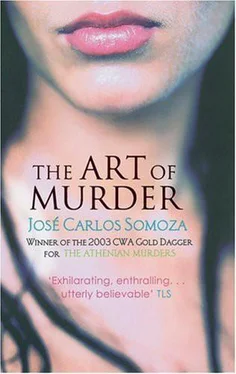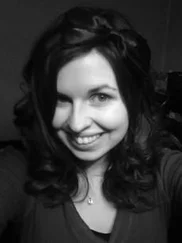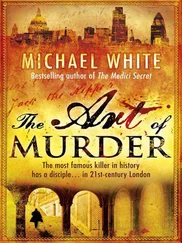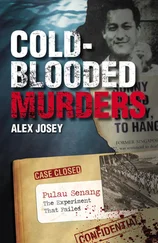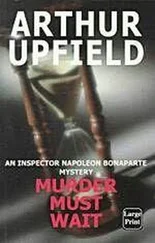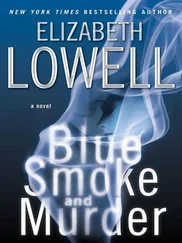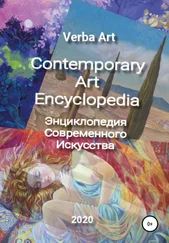Jose Somoza - Art of Murder
Здесь есть возможность читать онлайн «Jose Somoza - Art of Murder» весь текст электронной книги совершенно бесплатно (целиком полную версию без сокращений). В некоторых случаях можно слушать аудио, скачать через торрент в формате fb2 и присутствует краткое содержание. Жанр: Триллер, на английском языке. Описание произведения, (предисловие) а так же отзывы посетителей доступны на портале библиотеки ЛибКат.
- Название:Art of Murder
- Автор:
- Жанр:
- Год:неизвестен
- ISBN:нет данных
- Рейтинг книги:4 / 5. Голосов: 1
-
Избранное:Добавить в избранное
- Отзывы:
-
Ваша оценка:
- 80
- 1
- 2
- 3
- 4
- 5
Art of Murder: краткое содержание, описание и аннотация
Предлагаем к чтению аннотацию, описание, краткое содержание или предисловие (зависит от того, что написал сам автор книги «Art of Murder»). Если вы не нашли необходимую информацию о книге — напишите в комментариях, мы постараемся отыскать её.
Art of Murder — читать онлайн бесплатно полную книгу (весь текст) целиком
Ниже представлен текст книги, разбитый по страницам. Система сохранения места последней прочитанной страницы, позволяет с удобством читать онлайн бесплатно книгу «Art of Murder», без необходимости каждый раз заново искать на чём Вы остановились. Поставьте закладку, и сможете в любой момент перейти на страницу, на которой закончили чтение.
Интервал:
Закладка:
'Hirum, what I'm going to tell you is absolutely confidential, as I'm sure you understand. Apart from a small group we've called the "crisis cabinet", nobody knows anything, not even the insurance companies. We're preparing our ground.'
Oslo nodded, his black, sad eyes wide with concern. Miss Wood told him the title of the two works, and there was silence again. The muffled sound of the waterfall in the garden could be heard through the glass windows. Oslo was staring down at the floor. Eventually he said:
'My God… that poor child… that little girl… I'm not so sorry for those two criminals, but that poor little girl…' Monsters was just as valuable, if not more so, than Deflowering, but Miss Wood was well aware of Oslo's ideas. She had not come to discuss them.
'Annek Hollech…' Oslo said. 'I last talked to her a couple of years ago. She was charming, but she felt completely lost in that terrible world of human works of art. It wasn't just that lunatic who killed her. We all contributed to her murder.' He turned to face Wood. 'Who? Who can be doing this? And why?'
'That's what I want you to help me find out. You're considered one of the most important specialists in the life and work of Bruno van Tysch. I want you to tell me names and motives. Who could it be, Hirum? I don't mean the person destroying the canvases, but the one who is paying for their destruction. Think of a machine. A machine programmed to annihilate the Maestro's most important creations. Who would have the motive to programme a machine like that?' 'Who do you think it could be?'
'Someone who hates him enough to want to do him as much harm as possible.' Hirum Oslo leaned back in his chair, blinking.
'Everyone who has ever met Van Tysch both loves and loathes him. Van Tysch succeeds in producing masterpieces precisely because he creates that kind of contradiction in people. You know the main reason why I left him was because I found out how cruel his working methods were. "Hirum," he used to say, "if I treat the canvases as people, I'll never make works of art out of them.'"
Who am I telling this to, Oslo thought. Look at her sitting there, her face sculpted in marble. My God, I reckon the only person who has ever managed to really move her has been Bruno van Tysch.
'It's true that life hasn't helped him to be any different. His father, Maurits van Tysch, was probably even worse. Did you know he collaborated with the Nazis in Amsterdam?…' ‘I heard something to that effect.'
'He sold his fellow countrymen, Dutch Jews; he handed them over to the Gestapo. But he was clever about it; he made sure there were hardly any witnesses left. So nothing could ever be proved against him. He knew how to swim with the current.
Even today there are some people who question whether Maurits was a collaborator. But I think that was the reason why, immediately after the war, he emigrated to the tiny, peaceful town of Edenburg. It was there he met that Spanish woman, a child of Spanish Republican exiles, and they got married. She was almost thirty years younger than him, and I've no idea what attracted her to Maurits. I suspect he had the gift his son inherited twice over: the ability to dominate other people and turn them into marionettes for him to use for his own ends. A year after Bruno was born, his mother died of leukemia. It's easy to imagine how this embittered Maurits still further. And he took it out on his son…'
'As I understand it, he was a painting restorer.'
'He was a frustrated painter,' Oslo said with a wave of his arm. 'He took on the job of restoring pictures in Edenburg castle, but his dream was to be an artist. He was not much good at either task. Do you know, he used to thrash Bruno with his paintbrushes?'
‘I don't know anything about my boss' life,' April Wood responded, smiling briefly.
'Maurits used long-handled brushes to reach some of the paintings hanging high up on the castle walls. Apparently, he never threw away the worn-out brushes. I don't think he kept them specially to thrash Bruno with, but that's what he did.' 'Did Van Tysch tell you this?'
'Van Tysch never told me anything. He's as silent as the grave. It was Victor Zericky who told me. He was Bruno's childhood friend – perhaps his only friend, because Jacob Stein is nothing more than a worshipper. Zericky is a historian who still lives in Edenburg. He gave me a couple of interviews, and I managed to get a few facts from him.' 'Go on, please.'
'Everything could have ended there: a child mistreated by his parents who later perhaps might have become another restorer and frustrated artist… worse even than Maurits, because Bruno couldn't even draw properly,' Oslo giggled nervously. 'Whereas we know his father could… Zericky showed me some water-colours Maurits did that Van Tysch had given him: they're very good… But then the miracle happened, the "fairytale" as the Foundation's history calls it: Richard Tysch, the North American millionaire, crossed his path. And everything was changed forever.'
Wood was writing some of this down in a notebook she had taken out of her bag. Oslo paused, and gazed out of the window at the encroaching dusk in the garden.
'Richard Tysch was the person who made it possible for the Maestro to become the boss of an empire. He was a madman, a useless and eccentric millionaire who inherited a fortune that he threw away and several steel firms he sold as soon as his father died. He was born in Pittsburgh, but he saw himself as the direct descendant of the Pilgrim Fathers, those Puritan pioneers to the United States. He was obsessed with finding out about his family. He investigated where his name came from. Apparently, the Van Tyschs of Rotterdam split into two branches during the heyday of the Dutch West India Company. One ancestor went to North America, and founded the line that became steel and business barons. Richard Tysch wanted to find out about the "other branch", the European side of his family. At that time, the only two people of that name were Bruno's father and his Aunt Dina, who lived in The Hague. In 1968, Tysch went to Holland and paid a surprise visit to Maurits. He had been planning just a short, uneventful visit. He wanted to talk to Maurits about art (he had learnt he was a restorer), pick up some mementoes, and return to the United States loaded down with photos and historic "roots". But then he met Bruno van Tysch.'
Oslo was staring down at the filigree inlay on the knob of his cane. He caressed it absent-mindedly as he went on with his story.
'Have you seen photos of Bruno as a child? He was incredibly attractive, with his thick black hair, pale face and dark eyes, that mixture of Latin and Anglo-Saxon he has. A real young faun. His eyes had a strange fire to them. Victor Zericky says, and I believe him, that he could hypnotise people. All the girls in the village were crazy about him, even the older ones. And quite a few men felt the same, I can tell you. He was thirteen at the time.
Richard Tysch met him and fell for him. He invited him to go and spend the summer in his Californian mansion, and Bruno accepted. I suppose Maurits saw nothing wrong with it, especially considering how generous this god from the other side of the Atlantic had been. From then on, the two of them saw each other every summer, and kept up an extensive correspondence while Bruno was at school. Van Tysch later destroyed the letters. Some people say they had a Socrates-Alcibiades kind of relationship, others put it more crudely. All we can be sure of is that six years later, Richard Tysch left Bruno his entire fortune, and shot himself in the mouth with his shotgun. They found him propped on the trunk of a column in his palazzo on the outskirts of Rome. His brain was decorating the wall mosaics. Now the palazzo belongs to Van Tysch, as do all his other European properties. His will came as quite a surprise, as you can imagine. Of course, what relatives he had, all of whom had quarrelled with him, challenged it, but without success. Add to this the fact that Maurits had died two years earlier, and we can conclude that all of a sudden Bruno found himself with all the money and freedom in the world.'
Читать дальшеИнтервал:
Закладка:
Похожие книги на «Art of Murder»
Представляем Вашему вниманию похожие книги на «Art of Murder» списком для выбора. Мы отобрали схожую по названию и смыслу литературу в надежде предоставить читателям больше вариантов отыскать новые, интересные, ещё непрочитанные произведения.
Обсуждение, отзывы о книге «Art of Murder» и просто собственные мнения читателей. Оставьте ваши комментарии, напишите, что Вы думаете о произведении, его смысле или главных героях. Укажите что конкретно понравилось, а что нет, и почему Вы так считаете.
